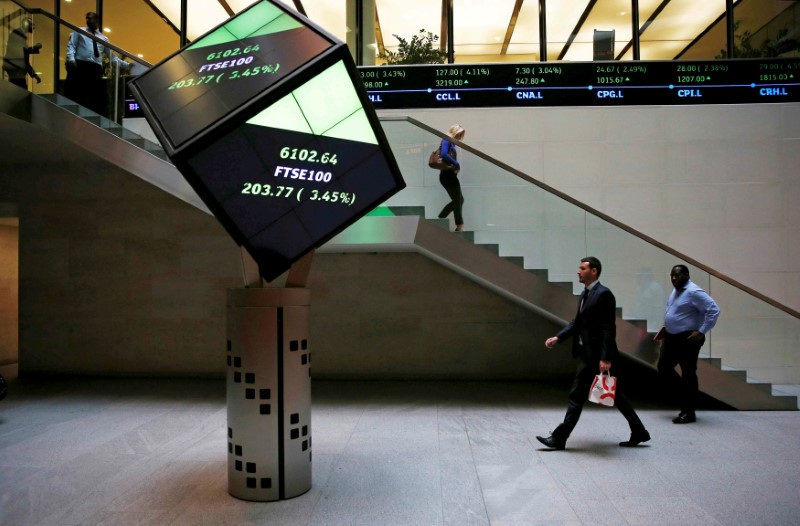By Jamie McGeever
LONDON (Reuters) - World markets baulked on Monday at the G20's decision to drop a decade-old pledge to resist trade protectionism, with stocks, the dollar, oil and the price of many major sovereign bonds all sliding into the red.
Investor scepticism over how much the U.S. Federal Reserve will be able to raise rates weighed on the dollar too, although with the exception of gold, the greenback's weakness failed to give a fillip to commodities, as is often the case.
European stocks fell as much as 0.3 percent and U.S. futures pointed to a fall of around 0.2 percent at the open on Wall Street.
Banks were among the biggest decliners in Europe, dragged down by a 3 percent fall in Deutsche Bank (DE:DBKGn) shares <.DBKGn.DE> one day before the start of Germany's biggest lender's 8 billion-euro cash call.
"European equity markets have started the week with a heavy risk-off sentiment after the G20 communique explicitly reflected U.S. intentions to establish trade protectionist measures," said Ipek Ozkardeskaya, senior market analyst at London Capital Group.
"As the world's number one economy is preparing to set significant barriers against the world, investors are increasingly worried," she said.
Financial leaders of the world's biggest economies dropped a pledge to keep global trade free and open, acquiescing to an increasingly protectionist United States after a two-day meeting failed to yield a compromise.
Breaking a decade-long tradition of endorsing open trade, G20 finance ministers and central bankers made only a token reference to trade in their communiques on Saturday.
The FTSEuroFirst index of leading 300 European shares fell 0.2 percent to 1,489 points (FTEU3), Britain's FTSE 100 (FTSE) fell 0.2 percent and Germany's DAX (GDAXI) fell 0.3 percent.
MSCI's broadest index of Asia-Pacific shares outside Japan (MIAPJ0000PUS) rose almost 0.4 percent to hit its highest level in more than two years on Monday. As a result, MSCI's global benchmark equity index was little changed (MIWD00000PUS).
On Friday, Wall Street was flat to negative, dragged lower by bank shares that slid along with Treasury yields.
The 10-year U.S. Treasury yield has fallen since the Fed raised rates last week for only the third time in over a decade. It edged up a basis point on Monday 20 2.51 percent (US10YT=RR).
The gap between two- and 10-year yields has shrunk recently, meaning the yield curve has flattened. This suggests investors are skeptical that growth and inflation will be strong enough to warrant a sustained cycle of rate hikes, and this has subsequently weighed on the dollar.
After raising rates last week, the Fed reiterated plans for a total of three rate hikes this year, fewer than the four markets were expecting.
DOLLAR DOWN
G20 financial officials reiterated their warnings against competitive devaluations and disorderly currency markets. The dollar didn't show much reaction, taking its cue instead from the moves in U.S. yields.
Currency markets are also focused on a raft of speeches by Fed officials this week, including Chicago's Charles Evans on Tuesday and Friday, Chair Janet Yellen on Thursday, Dallas's Robert Kaplan and Minneapolis's Neel Kashkari on Friday and New York's William Dudley on Saturday.
"Sentiment towards the dollar has deteriorated significantly," Societe Generale (PA:SOGN) FX analysts said in a note to clients on Monday.
The dollar index of its value against a basket of six currencies hit a six-week low of 100.02 on Monday before recovering most of its losses. A fourth straight lower close on Monday would mark its longest losing streak since November.
The dollar inched up 0.1 percent against the yen to 112.85 yen
Citi became the latest major bank to abandon its headline forecast for a fall in the euro to below parity with the dollar, upping its prediction for the single currency over the next six to 12 months to $1.04 from $0.98 previously.
Attention now turns to the French election, with the first presidential debate set to take place on Monday. Opinion polls show independent centrist Emmanuel Macron would lead far-right leader Marine Le Pen by a hair in first-round voting, before beating her handily in the run-off.
In commodities, oil prices continued their downward trend as OPEC supplies remained steady despite touted cuts, and rising U.S. drilling contributed to concerns about a supply glut.
U.S. crude (CLc1) dropped 1.4 percent to $48.09 a barrel.
Global benchmark Brent (LCOc1) fell 1 percent to $51.25.

The weaker dollar boosted gold